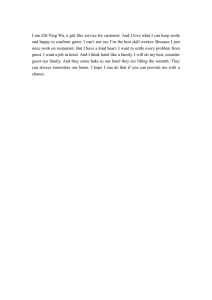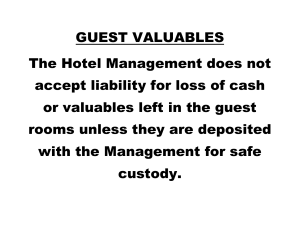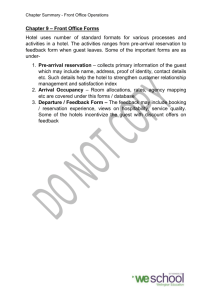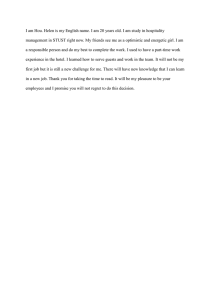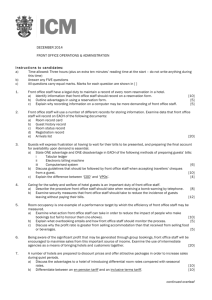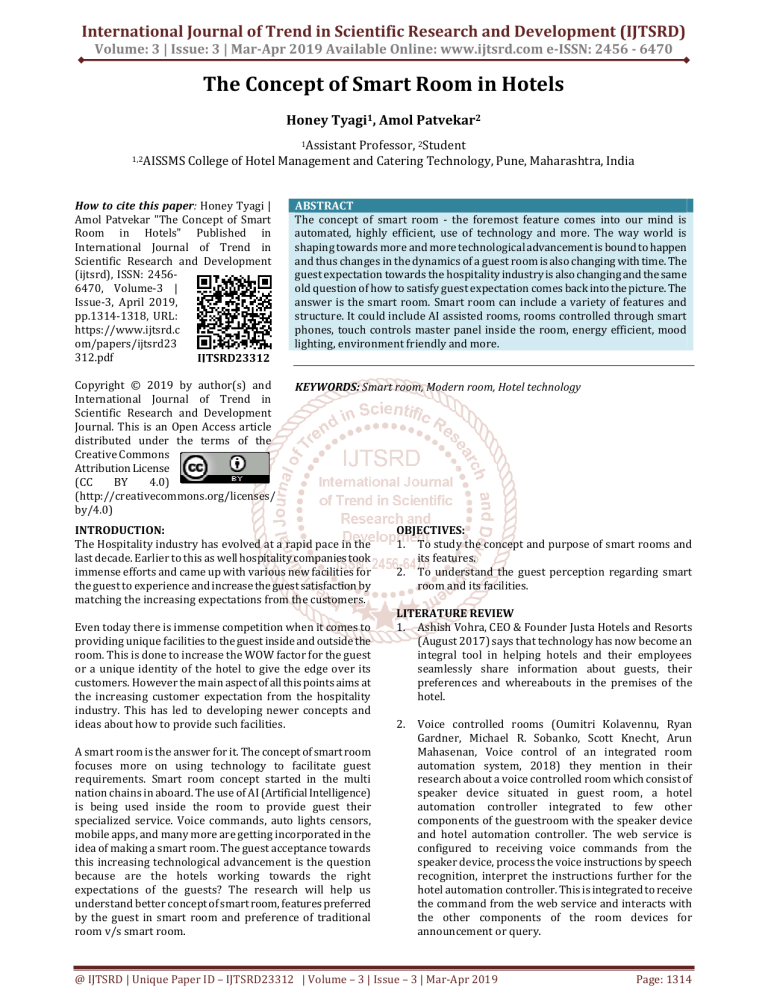
International Journal of Trend in Scientific Research and Development (IJTSRD) Volume: 3 | Issue: 3 | Mar-Apr 2019 Available Online: www.ijtsrd.com e-ISSN: 2456 - 6470 The Concept of Smart Room in Hotels Honey Tyagi1, Amol Patvekar2 1,2AISSMS 1Assistant Professor, 2Student College of Hotel Management and Catering Technology, Pune, Maharashtra, India How to cite this paper: Honey Tyagi | Amol Patvekar "The Concept of Smart Room in Hotels" Published in International Journal of Trend in Scientific Research and Development (ijtsrd), ISSN: 24566470, Volume-3 | Issue-3, April 2019, pp.1314-1318, URL: https://www.ijtsrd.c om/papers/ijtsrd23 312.pdf IJTSRD23312 ABSTRACT The concept of smart room - the foremost feature comes into our mind is automated, highly efficient, use of technology and more. The way world is shaping towards more and more technological advancement is bound to happen and thus changes in the dynamics of a guest room is also changing with time. The guest expectation towards the hospitality industry is also changing and the same old question of how to satisfy guest expectation comes back into the picture. The answer is the smart room. Smart room can include a variety of features and structure. It could include AI assisted rooms, rooms controlled through smart phones, touch controls master panel inside the room, energy efficient, mood lighting, environment friendly and more. Copyright © 2019 by author(s) and International Journal of Trend in Scientific Research and Development Journal. This is an Open Access article distributed under the terms of the Creative Commons Attribution License (CC BY 4.0) (http://creativecommons.org/licenses/ by/4.0) KEYWORDS: Smart room, Modern room, Hotel technology INTRODUCTION: The Hospitality industry has evolved at a rapid pace in the last decade. Earlier to this as well hospitality companies took immense efforts and came up with various new facilities for the guest to experience and increase the guest satisfaction by matching the increasing expectations from the customers. Even today there is immense competition when it comes to providing unique facilities to the guest inside and outside the room. This is done to increase the WOW factor for the guest or a unique identity of the hotel to give the edge over its customers. However the main aspect of all this points aims at the increasing customer expectation from the hospitality industry. This has led to developing newer concepts and ideas about how to provide such facilities. A smart room is the answer for it. The concept of smart room focuses more on using technology to facilitate guest requirements. Smart room concept started in the multi nation chains in aboard. The use of AI (Artificial Intelligence) is being used inside the room to provide guest their specialized service. Voice commands, auto lights censors, mobile apps, and many more are getting incorporated in the idea of making a smart room. The guest acceptance towards this increasing technological advancement is the question because are the hotels working towards the right expectations of the guests? The research will help us understand better concept of smart room, features preferred by the guest in smart room and preference of traditional room v/s smart room. OBJECTIVES: 1. To study the concept and purpose of smart rooms and its features. 2. To understand the guest perception regarding smart room and its facilities. LITERATURE REVIEW 1. Ashish Vohra, CEO & Founder Justa Hotels and Resorts (August 2017) says that technology has now become an integral tool in helping hotels and their employees seamlessly share information about guests, their preferences and whereabouts in the premises of the hotel. 2. Voice controlled rooms (Oumitri Kolavennu, Ryan Gardner, Michael R. Sobanko, Scott Knecht, Arun Mahasenan, Voice control of an integrated room automation system, 2018) they mention in their research about a voice controlled room which consist of speaker device situated in guest room, a hotel automation controller integrated to few other components of the guestroom with the speaker device and hotel automation controller. The web service is configured to receiving voice commands from the speaker device, process the voice instructions by speech recognition, interpret the instructions further for the hotel automation controller. This is integrated to receive the command from the web service and interacts with the other components of the room devices for announcement or query. @ IJTSRD | Unique Paper ID – IJTSRD23312 | Volume – 3 | Issue – 3 | Mar-Apr 2019 Page: 1314 International Journal of Trend in Scientific Research and Development (IJTSRD) @ www.ijtsrd.com eISSN: 2456-6470 3. 4. 5. 6. 7. Artificial intelligence (Selva kumar Muthumanicam, The Evolution of Artificial Intelligence (AI) in Hotel Industry, 2018) he mentions in his article that all hotels currently and in future will need an integrated system that is constantly acquiring, contextualizing, processing and analysing the data of customer. The guest information which is captured while interaction from (various sources) from reservation, Check-in to checkout by every staff members are recorded in system. This data, with the assistance of AI can be leveraged by hotels for analytics to determine guest personas and create customized services, communications and promotional offers that provide targeted and amazing unique experiences. This data will help hotel for forecasting and actionable insights to provide superior experience and guest engagement. Also, the hotels can map the total journey of a guest, both digital and in-person, to identify patterns around guest experience preferences and shortcomings . Mobile controlled tasks.( Barrett M. Kreiner, Jonathan L. Reeves, Ryan Schaub, Remote control of electronic devices via mobile device , 2017) they mention in the their research that electronic devices and systems are integrated and controlled by mobile remote control device. The mobile device has a unique identifier, and the electronic device transmits a presentation of a remote control to the mobile device. A user of the mobile device controls the electronic device by operating the “virtual” remote control displayed on the mobile device. The user may further define his or her custom remote control. Touch controlled panel (Conrad, Pune). The master touch control electrical fixture is one of the most unique piece of equipment used in the industry. This technology has already been getting in use in the Industry because of its easy to use and also for its catchy element. For the guests it’s a moment of WOW factor. This technological advancement helps to control all the lighting fixtures in the room from the Master Panel set up in the room. The guest can also calibrate the temperature for the HVAC for the room. Even the mood lighting can be selected directly from the controlled panel. The guest just has to select the kind of lighting he/she need at that point of time. Also in some places the opening and closing of curtains can also electrically operated from the master panel. This way the guest can access almost every electrical fixture from one single point. This helps in easing out guest job. This also helps in increasing the customer satisfaction from the hotel room. Chat bots. (Ryan, How Chat bots Are Transforming the Hospitality Industry, 2018) in his article he talks about that how hospitality industry accepting chat bots usage and bringing transformation along with them. The hospitality industry aims to provide best experience, personalised services to their customer with efficiency. These services are provided easily by the help of chat bots. Energy efficient rooms ( Vlatko Cingoski and Biljana Petrevska, Making hotels more energy efficient: the managerial perception, 2017) in their article they have mentioned that hotels are one of the most energy demanding sector and ranked as top five in energy consumption with similarly high energy costs. Therefore, it is an inevitable relationship between the hotel industry development and the environmental and energy efficiency impacts. The hotel management aims to control the operating cost of energy by introducing new sources of energy that preserve environment and makes as eco-friendly hotel. Reducing the operating cost increases the profit and allows improved competitiveness in the hospitality segment. The introduction of the energy efficient practices allows enriched guests comfort, increased hotel aesthetic value, reduced maintenance system failures and so forth. Hence it is important for hotels to follow energy conservation practices. 8. Motion sensor Lights (Jesse DePinto, Occupancy Sensing Improves Hospitality,2017) mentions that HVAC consumption is 2nd most highest in hospitality sector. This is the due to the tremendous growth in hotel properties. Thus it is very important for hotels to find out the answer to reduce the consumption and cost and be in the competition.Hotels are adopting motion sensor lights which lit onlu when there is any person inside the room thus saves lot of energy. RESEARCH METHODOLOGY Secondary data The secondary data was collected from online journals, hospitality magazines, internet, blog and books. Primary data The research was done conducting a survey of the millennial customer who are and also going to use the future hospitality services. It was necessary to understand their expectations are the hospitality industry is focusing more on what the upcoming generation demands from them. The evaluation of traditional rooms’ services to modern smart rooms could be better understood from the customers stayed in and what they prefer from the hospitality industry. It also enables to understand the various facilities the guests are expecting and what the hospitality industry has started developing in the coming future. The survey also helped to understand how technology has become an important part of our systems and how necessary it is to embrace it and use it to greater effect. The survey consists of a total of 156 responses from different customers stays in various categories of hotels. The following are the questions included in the survey. DATA ANALYSIS: Age: The survey is taken in consideration the future travellers’ requirement from the hotels and focus on the millennial customers. @ IJTSRD | Unique Paper ID – IJTSRD23312 | Volume – 3 | Issue – 3 | Mar-Apr 2019 Page: 1315 International Journal of Trend in Scientific Research and Development (IJTSRD) @ www.ijtsrd.com eISSN: 2456-6470 1. TYPE OF HOTEL THE GUEST PREFERS TO STAY: 7.1% respondent spent 8000 and above on room charges per night. Money is not a concern to them. Their highest priority is the comfort and most important luxury. They have very high expectations from the hotel as they are spending so much so their accommodation and want the similar kind of service from the hotel. Guests having high spending power can get unpleased with small problems if aroused in front of them. Customer loyalty is low if quality service is not provided. FREQUENCY OF CUSTOMER TRAVELLING Data interpretation The above chart shows the type of hotel the guests prefer to stay. The total responses received were 156. The data mentions that respondents selected 3 star hotel are 12.5%, 4 stars are 21.4%, 5 star are 23.2%, budget hotel are 42.9%. Guests are more comfortable spending more money when it comes to accommodation. Customers have higher demands from the hotels are they are spending even more than before. Thus guest satisfaction becomes more important. The data also suggest that there are still many people who still prefer to stay in Budget hotels. This shows that people are still budget concerned when it comes to spending however would not hesitate if it’s worth the extra dime. 2. Average money spend on room charges per night: Data interpretation The above data shows the average spent by the customer for room charges during stay per night. Data interpretation The above data talks about how frequently guests travel out of the city for any purpose. According to the data collected 42.9% of the respondent travel once in 6 months. 28.6% travels once in 2-4 months. 14.3% travels once in a year. 7.1% travels once in a month and the same number of respondent travels twice a month. Referring to the data given above respondent travelling one in 6 months is the highest of all. Once in 6 months is a significant ratio to travel out of the city. It gives more opportunity for the hospitality industry to run business. There are more respondents travelling once in 2 to 4 months. This shows people are more open to travel for any purpose and like to explore more than ever. This gives immense opportunity to the hospitality industry and also increases the customer expectation. There also 7.1% customers who travels as frequently as once a month. This gives us an idea for the demand of accommodation is high around the country. There are 14.3% travels just once in a year. This number is bound to increase as more people have started getting employed and also have higher income which will enhance their spending power in this industry. 3. THE GUEST PREFERS TO STAY IN : 23.2% of the respondent spent only 1000 to 2000 rupees on their room charges, These customers are those which are budget minded and do have high spending capacity with them. They refer to compromise their expectations with their budgets. These customers stay in budget hotels. The basic expectations are of higher importance to them. 41.1% of the respondent spent around 2000 to 4000 rupees these customers are those which prefer to say in budget or 3 star hotels. This shows that people who are budget minded but still wouldn’t hesitate to spend a few more if it is worth the dime. 28.6% of the respondent spent 4000 to 8000 rupees as per the current market a room at a 4 star and 5 star hotel. Customers here at looking at good quality of service and have high expectations from the hotels. Data interpretation The above data shows that maximum people would like to stay in smart room over the traditional room. This shows @ IJTSRD | Unique Paper ID – IJTSRD23312 | Volume – 3 | Issue – 3 | Mar-Apr 2019 Page: 1316 International Journal of Trend in Scientific Research and Development (IJTSRD) @ www.ijtsrd.com eISSN: 2456-6470 that the millennial have higher expectations from the hospitality industry. They are more open to technological advances and have more new experiences. 4. Features which are preferred by the customers in the smart room destinations or places around the city or hotel. They can book cars on rentals and access to booking tickets to various entertainment facilities. Mobile application can also be used for payment of bills or receiving any discount offers directly on the cell phones. Customer wants more connectivity with the place in which they are going to stay. 78.6% of the customer wants to have the facility of automated censor operated lights inside the rooms. Maximum numbers of people have preferred this facility over all others. This is a very good feature which can be included in the hotel rooms. The customers don’t need to do anything when it comes to operating the lighting system of the room. It makes the room energy efficient as the lights are shut down when there is no one inside the room thus saving energy of the hotel. The sensors are located inside the room and track the movement of the guests and lights the room accordingly. Data interpretation: The above data shows the facilities which the customer expects from a smart room . It is important to understand customer expectations from a smart room. This will help hospitality industry can make technological advancements in the above facilities. Referring to data bathroom mirror TV is only preferred by 42.9% of the customers shows moderate demand of facility in the room. Probably, the younger generation is more into going outside the room and exploring the new things out there at a particular place. 57.1% of the customers would like to avail the facility of voice control inside the room. The demand of this facility is high as this is unique features for the hotel rooms. The guests can directly command their demands or tasks and the action is completed in an automated way without any effort of the guest. This eases out the guest job and directly controls the stay through voice command given to the system. Lighting, air conditioning temperature, TV channel, and curtains can be entirely managed by the facility of voice command. 71.4% of the customers want the facility of touch controlled electrical fixtures. The demand for this particular facility is very high when compared to other facilities in the room. This again is a unique technological advancement which can be included in the hotel rooms. This is an eye catching feature which increases the WOW factor for the guest. 67.9% of the customer wants to have the facility of mood lighting or preference lighting according to the requirements of the customer. The demand for this facility is pretty high when compared to other facility. This inside the room will enhance the guest experience as the guest can configure the lighting as per his/her mood and preference. It gives a personalized kind of service to the guest. 26.8% of respondent want the facility of automated concierge. This is the lowest of all facilities demanded from the customer. 5. How much the guest would pay extra to avail smart room facilities? 46.4% of the customer want have artificial intelligence to solve their problems. Artificial intelligence is one of technological advancements in the world. However it seems that customer prefer to have more human interactions when it comes to the hospitality industry. Human touch to the services make the customer feels extra attention is given to them and adds quality of service. Only a human being can understand the problems of the customer better than the artificial intelligence. Data interpretation The above chart shows that 28.6% respondents are willing to spend extra rupees 1000 -2000 on the smart room facilities, 12.5% willing to spend more than 2000rupees and above, 50% willing to spend only 500-1000 rupees, 8.9% willing to spend less than 500 rupees. From the above data, the conclusion is made that customers are budget minded when it comes to spending extra for the smart facilities. It has to be considered that customers here are millennial guests and wouldn’t want to spend extra on getting those facilities. If the facilities are included in the room rate then is affordable for the guests to pay and they would more open to experience these facilities. 58.9% of the customers would prefer to have the facility of mobile Applications to control their stay. This facility enables the guest to directly connect them to the room in which they have booked. Not only that they can also choose the room according to their preferences and category. The mobile application will help the guest not only to control the room amenities but also they can look for surrounding Conclusion: The findings of the research are: 1. The concept of smart room is a unique. It has all the ingredients to succeed in the near future. The technological advancements which are happening in the hospitality industry will help the improvement in smart room facilities. @ IJTSRD | Unique Paper ID – IJTSRD23312 | Volume – 3 | Issue – 3 | Mar-Apr 2019 Page: 1317 International Journal of Trend in Scientific Research and Development (IJTSRD) @ www.ijtsrd.com eISSN: 2456-6470 2. 3. 4. More number of millennial customers prefers smart rooms over a traditional room features. Customers are more technology driven and want more automated rooms than before. Now days, more number of people are travelling out of their home city to travel around the world and experience new things. It is actually feasible for the hotels to actually start adapting smart rooms in their hotels to enhance guest experiences. Customers want more connectivity with their hotels and want to know everything possible before coming and during stay in the hotels. Suggestions and recommendations: 1. Hotel should know the demands of the customers and also the opportunity available of them in the market. 2. Technological advancement will help the hospitality industry in the near future as it become necessary to come enhance guest service and increase guest satisfaction 3. The feasibility of these technology which to be used in the hotels will initially can be afforded only by 5 star hotel. But more and more industries setting up the cost of these technological products is bound to go down and even the budget hotels can afford this in near future. 4. As technology advancement is expensive hence the hotels can adopt one or few smart services at a time so that the investment cost burden is not sudden for a particular year. Limitations: 1. The survey does not include the factor of the older aged people. 2. Not all the customers are comfortable using technological products. 3. Research is done based on the current scenario and customer expectations can change. REFERNECES: [1] Barrett M. Kreiner, Jonathan L. Reeves, Ryan Schaub, Remote control of electronic devices via mobile device , 2017 https://patents.google.com/patent/US8937534B2/en . [2] Conrad, Pune https://conradhotels3.hilton.com/en/hotels/india/con rad-pune-PNQCICI/index.html [3] Jesse DePinto, OCCUPANCY SENSING IMPROVES HOSPITALITY ,2017 https://www.linkedin.com/pulse/occupancy-sensingimproves-hospitality-jesse-depinto [4] Oumitri Kolavennu, Ryan Gardner, Michael R. Sobanko, Scott Knecht, Arun Mahasenan, Voice control of an integrated room automation system, 2018 https://patents.google.com/patent/US20180211666A 1/en [5] Ryan, How Chat bots Are Transforming the Hospitality Industry, 2018 https://chatbotslife.com/how-chatbotsare-transforming-the-hospitality-industry7631089dcc09 [6] Selva kumar Muthumanicam, The Evolution of Artificial Intelligence (AI) in Hotel Industry, 2018 https://chatbotnewsdaily.com/the-evolution-ofartificial-intelligence-ai-in-hotel-industry23298d1e8dd4 [7] The Personalization Paradox – Indian hospitality rediscovers, Ashish Vohra, CEO & Founder Justa Hotels and Resorts August 24, 2017 https://www.crayondata.com/blog/personalizationparadox-indian-hospitality-rediscovers/ [8] Vlatko Cingoski and Biljana Petrevska, Making hotels more energy efficient: the managerial perception, 2017 https://www.tandfonline.com/doi/full/10.1080/1331 677X.2017.1421994 @ IJTSRD | Unique Paper ID – IJTSRD23312 | Volume – 3 | Issue – 3 | Mar-Apr 2019 Page: 1318


